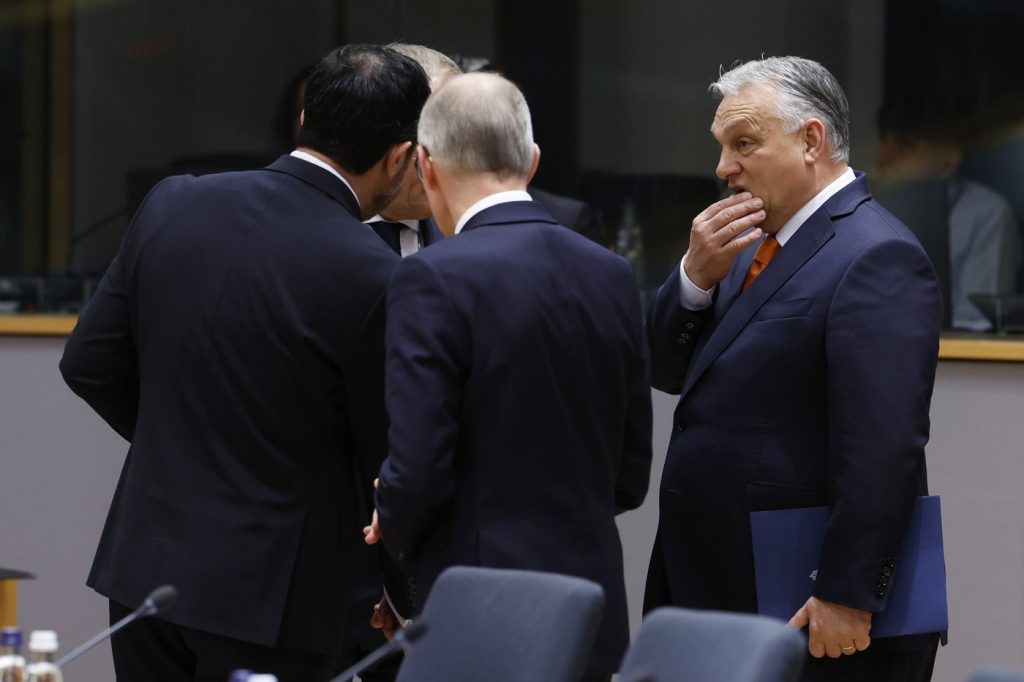BRUSSELS (AP) - Hungary is on the verge of making headlines once again as every other nation within the European Union prepares to endorse a joint statement in support of Ukraine for the second time in a month. This upcoming decision highlights the increasing isolation of Hungarian Prime Minister Viktor Orbán, who has struggled to block genuine EU aid to Ukraine, while other member states devise alternative approaches to circumvent his veto.
Despite this isolation, Orbán finds some support in U.S. President Donald Trump, who advocates for a ceasefire in Ukraine. Trump has publicly criticized Ukraine for the ongoing conflict, suggesting that Kyiv is prolonging the war, which is now considered the largest land confrontation in Europe since World War II.
The 27 EU member nations aim for consensus in important decisions, especially concerning sensitive foreign policy matters, where unanimity is often legally required. Under Orbán's staunchly nationalist leadership, Hungary has distanced itself from the EU regarding the Ukraine crisis, frequently stalling aid packages and sanctions. Other EU nations, however, are increasingly willing to move ahead without Hungary, an attitude expected to be underscored at the EU summit in Brussels on Thursday.
Orbán maintains notably close ties with Russian President Vladimir Putin and supports Trump's initiatives for peace talks with Moscow, which largely exclude Kyiv and the EU. A couple of weeks ago, Hungary declined to endorse a joint EU statement emphasizing Ukraine's need for military and financial support to achieve "peace through strength." This refusal illustrates Hungary's diverging stance from its European counterparts.
In anticipation of the summit, Hungary's European Affairs Minister, Janos Boka, signaled that Budapest would again withhold its endorsement from the joint statement being prepared for the meeting. He stated that the references to Ukraine contradict Hungary's strategic interests and vision for a new European security architecture.
EU officials and diplomats from other nations have indicated that they will not engage in lengthy discussions with Budapest if an agreement on Ukraine seems unattainable. During an emergency summit two weeks ago, European Council President Antonio Costa described Hungary as "isolated," emphasizing that while Hungary's position is respected, it is merely one among 27—where the majority holds greater weight.
Although Hungary can block joint statements and disrupt EU proceedings, it does not possess the power to hinder significant EU defense loan packages or prevent member states from increasing military budgets, both of which would directly support Ukraine. Meanwhile, as discussions evolve regarding Ukraine’s future, the EU is keen to express backing for Kyiv. Recently, six northern European countries urged the European Commission to expedite Ukraine's accession to the EU. Following Hungary's removal of a veto, Ukraine obtained approval to commence membership negotiations last year, yet these dialogues have not yet commenced.
Ministers from Denmark, Sweden, Finland, Estonia, Latvia, and Lithuania—nations bordering or closely situated to Russia—have called for "concrete proposals" to advance Ukraine's accession process, as highlighted in a letter obtained by the Associated Press. Sweden’s European Affairs Minister, Jessica Rosencrantz, underscored that supporting Ukraine's path toward EU membership is "an investment in the security of our entire continent."
Typically, EU membership can require years, if not decades, of reforms; however, President Ursula von der Leyen has hinted that Kyiv could potentially join by the end of the decade. Orbán has threatened to obstruct Ukraine’s membership and plans a public opinion survey on the matter, as enlargement decisions necessitate unanimous consent, which has historically stalled other membership bids, notably Turkey's.
The prospect of future U.S. support for Kyiv is uncertain following a fallout between Trump and Ukrainian President Volodymyr Zelenskyy. On the eve of the summit, Orbán addressed a gathering of far-right EU politicians, expressing his opposition to financial aid aimed at sustaining Ukraine's combat efforts. He articulated that the sole mission of the European Union should be to support Trump’s peace initiatives.
While EU leaders deliberate on long-term strategies to reinforce support for Kyiv, the influential role of the United States continues to shape the conflict's trajectory. Ukraine and Russia have tentatively agreed to a limited ceasefire following Trump's communications with both leaders, although the specific timing and implementation remain unresolved.










